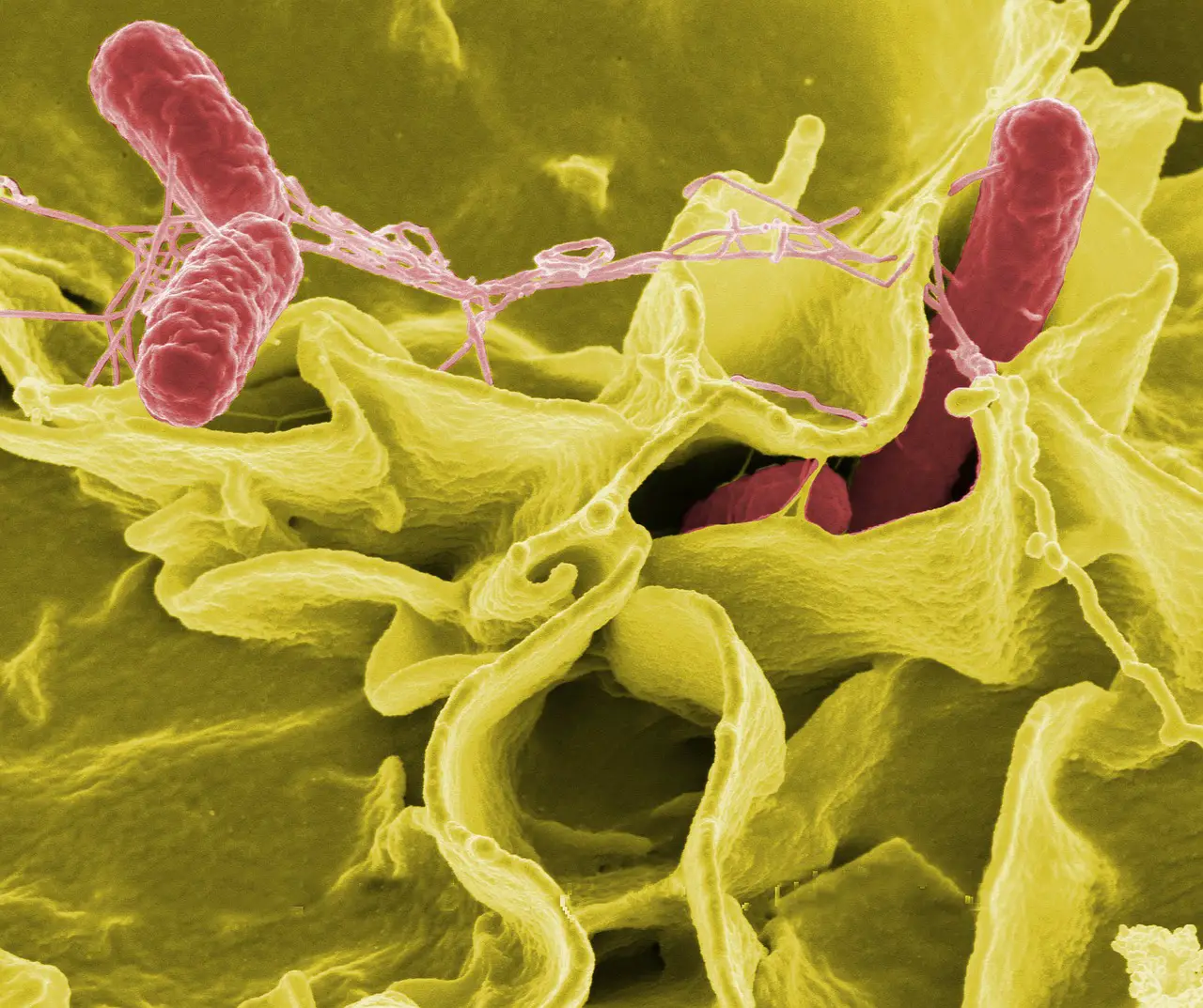The bacterial disease also known as Salmonella infection affect the intestinal tract. This bacteria lives in human and animal intestines. People can become infected mostly through contaminated food or water.
People who are infected with salmonella infection have no symptoms. It can develop fever, diarrhea and abdominal cramps within 8-72 hours. Healthy people recover in few days without treatment.
Medical attention is required when the diarrhea associated with salmonella infection results with dehydration. Complications threatening for live can develop if the infections spreads beyond your intestines. Countries with poor sanitation have a higher risk for infecting with salmonella.
Symptoms
Infection is caused by eating eggs, egg products, raw or undercooked meat. This infections are classified as gastroenteritis. Symptoms of infection include:
- Nausea
- Abdominal cramps
- Vomiting
- Fever
- Diarrhea
- Blood in the stool
- Headache
This symptoms last 4-7 days but it takes months for you to return to normal. A varieties of salmonella bacteria can result deadly disease.
Causes
Eating foods that are contaminated by feces are one of the ways to become infected with salmonella.
- Not cooked meat or seafood. During the butchering process faces may get onto the raw meat and poultry. Harvesting form contaminated water and consuming can lead to infection.
- Not cooked Eggs. The egg’s shell is a perfect barrier to contamination but infected chickens may produce eggs with salmonella before the shell is formed. Homemade souses like mayonnaise contain raw eggs.
- Fruits or vegetables. Contamination with salmonella may become in the process of harvesting in the field and wash during processing of fruits and vegetables.
- Foods also can become contaminated when they are prepared by people who after using toilet don’t wash their hands. Infection can occur if you touch something contaminated and then put your fingers in your mouth.
Risk Factors
Activities that bring you closer with salmonella bacteria may increase your risk of infection and may weaken your resistance to infections.
Increased exposure
- International travel. Developing countries with poor sanitation have higher risk of salmonella infection.
- Owing a pet bird or reptile. Reptiles and birds can by infected with salmonella bacteria.
Stomach or bowel disorders
The human body can beat salmonella infection, in many ways. One of them is stomach acid in our body, that can kill this bacteria. Some medical problems and medicaments can lead to this situation. For example:
- Antiacids – when acidity in our body takes low, bacteria salmonella can easily survive more and more.
- Inflammatory bowel disease – which involves chronic inflammation of all or part of your digestive system and easily let salmonella bacteria to survive.
- Use of antibiotics- antibiotics can also have negative effects in this situation.
They can destroy the “good” bacteria in our body and reduce ability to fight off against salmonella.
Immune problems
Immune system is a set of cells, organs, tissues that work together, and their job, is to protect the human body. The immune system is the body’s defense against infections. This medical problem can increase risks of contracting with salmonella, because they are harming the immune system:
- AIDS
- Malaria
- Corticosteroids
- Sickle cell disease
- Anti-rejection drugs taken after transplants
Complications
Salmonella is not life – threatening infection. On the other side she can provocate dangerous effects in people with weak immune system like children, pregnant woman, infants.
Dehydration
Dehydration can occur when you lose more fluid than you take it. In this state your body is not hydrated enough with water and other fluids. With persistent diarrhea, and if you don’t consume fluid you may become dehydrated. Symptoms of dehydration are: dry mouth, sunken eyes, reduced production of tears.
Bacteremia
Bacteremia is presence of bacteria in your bloodstream. If salmonella enters in blood stream, it can infect body tissues, including: meningitis, endocarditis, osteomyelitis.
Reactive arthritis
Reactive arthritis is joint pain triggered by an infection in part of your body — most often your intestines, genitals or urinary tract. People with salmonella infection have a higher risk of developing this disease. Reactive arthritis can cause eye irritation and painful joins.
Test and diagnosis
Salmonella infection can be detected with a blood test for bacteria or test of your stool.
Treatments and drugs
Antidiarrheals are medication that can provide symptomatic relief for diarrhea. But they can prolong the diarrhea which is associated with salmonella.
You can take antibiotics in cases of invasive disease. Antibiotics therapy can short this illness and kill the bacteria if she is already in your bloodstream.
Lifestyle and home remedies
The most important is to not to allow to dehydrate. You must take a lot of fluids. For The children is good to take rehydration solution which is type of fluid that can prevent diarrhea.

